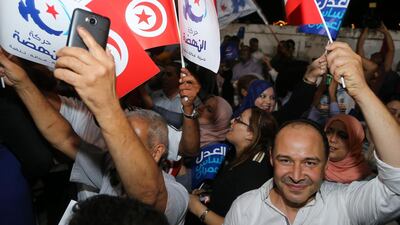Tunisia was in limbo yesterday after exit polls showed no clear majority in Sunday's legislative elections, with the two front runners ruling out a coalition.
Unofficial polls put Ennahda a few points clear of second-placed populists Qalb Tounes (Heart of Tunisia), but with an absolute majority seeming to be beyond the reach of any party, the path ahead looks difficult.
Official results for the election are expected on Wednesday although both parties have already declared victory, causing some confusion.
"We're confident the polls are correct," Ennahda's Khalil Amiri said at party headquarters in Tunis yesterday.
He said the party had forged a number of alliances they could call upon to begin assembling a majority.
The party’s supporters celebrated into the evening on Sunday, sounding car horns and cheering.
However, if the exit polls are correct, Ennahda will win only 40 seats – a long way off the 109 required to form a government. This means there will probably be weeks of negotiations and political horse trading.
If parties are unable to form a government within two months, it will fall to the president to do so and if that proves impossible, the electorate will be forced to return to the polls.
"The political landscape is incredibly fragmented, with it seeming that no party will gain over 20 per cent of the vote," said Sharan Grewal, a visiting fellow at the Brookings Institution think tank specialising in Tunisian affairs.
"It will take at least four parties to form a government, and even more if Qalb Tounes is not included. Get ready for several weeks if not a couple of months of negotiations."
It was expected that support for Qalb Tounes would have been dented by recent allegations of a $1 million contract between the party's leader – imprisoned TV boss Nabil Karoui – and lobbyists Dickens and Madson. However, Mr Karoui has campaigned using populist promises that his party will make Tunisia's overlooked poor a priority, and appears to have retained his popularity.
Mr Karoui has been in police detention since August in a case brought three years ago by a transparency watchdog. He denies any wrongdoing.
"Mr Karoui won 15.6 per cent of the vote in the presidential election, and Qalb Tounes won 15.6 per cent in the parliamentary elections," Mr Grewal said, suggesting they had sustained support.
"[Mr Karoui's] supporters had already dismissed charges of money laundering and tax evasion; it's no surprise they also dismissed the lobbying contract," he said. These are the third elections to be held in the North African country since the revolution in 2011 and the second to be staged under Tunisia's 2014 constitution.
Although the country is suffering from a stuttering economy and ingrained unemployment, democratic progress has been marked.
Under the new constitution, the country's parliament has been elevated from acting as the rubber stamp to past autocracies to a body carrying real independence and heft. But despite this, infighting and parliamentary fractiousness have stalled progress and fuelled voter disenchantment with those elected to run the country.
Irrespective of the make-up of the new government, or the time taken until its formation, the economic and social challenges that have bedevilled past administrations remain unchanged.

